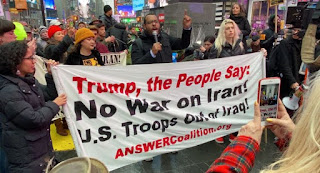In a move consistent with the Islamic Republic's decades-old
policy regarding Israeli-Palestinian issue, Iranian officials have harshly
criticized US President Donald Trump's "Deal of the Century".
Speaker of the Iranian Parliament, Ali Larijani wrote a
letter to the heads of parliaments around the world describing Trump's Deal of
the Century as "disgusting," and "in violation of all
international agreements and laws including the UN Charter."
Larijani wrote, “The deal ensures the continuation of
occupation of Palestine and promised that Muslim nations and countries will
confront the imposition of this unilateral deal."
He accused the US President of acting based on his personal
interests rather than consulting the UN or the Palestinians.
Larijani also echoed Iranian Supreme Leader Ali Khamenei's
idea of holding a referendum in the Palestinian territories to determine the
fate of Palestinians.
Iran's Foreign Minister Mohammad Javad Zarif slammed
the US plan as "a nightmare for the region." He wrote in a tweet
that the Vision for Peace "is simply the dream project of a
bankruptcy-ridden real estate developer." Zarif hoped that deal would be
"a wake-up call for all the Muslims who have been barking up the wrong
tree."
In an earlier tweet, Zarif characterized the Deal of the
Century as "an illusionist plan that is dead on arrival."
Repeating the idea of holding a referendum in the
Palestinian territory, Zarif suggested that “Instead of a delusional ‘Deal of
the Century’—which will be D.O.A.—self-described ‘champions of democracy’ would
do better to accept Iran's democratic solution proposed by Ayatollah Khamenei.”
Iranian Foreign Ministry Spokesman, Abbas Mousavi expressed
Iran's official view saying, "The Zionist regime is an occupying regime
and the only solution to solve the Palestinian crisis is a referendum among all
main residents of the Palestinian land and such vicious plans are doomed to
failure."
Mousavi called on "All free nations and governments in
the region and across the world to counter Trump's "disgraceful"
scheme." However, he regretted that "some Muslim countries have
forgotten the Palestinian cause," adding that such an attitude will
undermine "the future and prestige of Muslims and Islamic countries."
Khamenei's office belatedly posted a series of tweets on the
issue Tuesday afternoon which appear to have been taken out of his previous
speeches.
In the tweets Khamenei said, "The Deal of the Century
will never bear fruit," and called the "Jewishization of Qods" a
"foolish and unwise" act. He reiterated that "The Palestinian
nation and all Muslims will definitely stand up to them and not allow the so-called
Deal of Century to be realized."
Usually, as it works in Iran, during the first hours after a
development like the announcement of the Deal of the Century, everyone who
considers himself or herself a politician says something about the matter which
may not necessarily reflect the views of the government. Later, the Foreign
Ministry Spokesman offers the regime's attestation in the matter.
The spokesman's statement as seen above contains three
elements.
First, the regime does not like the Deal of the Century, second,
it calls on other Muslim nations to oppose the deal and third, it offers
Khamenei's solution which is holding a referendum.
All later comments, including Friday prayers sermons,
embodied one or more of the three arguments. Naturally, those who take a more
hardliner stance on the issue, including military officials, will focus on the
confrontational part, calling on other nations to resist Trump's idea.
However, in this particular case, any comment by officials
or any analysis by the media are also mixed with the usual anti-US and
anti-Trump jargon while also marking the Islamic Republic's antagonistic
opposition to the existence of Israel.
Traditionally, the Islamic Republic has opposed all
solutions to the Israel-Palestinian conflict throughout the past four decades. Ayatollah
Khamenei came up with the idea of referendum inspired by former
ultraconservative President Mahmoud Ahmadinejad but put it forward after his
Presidency.






